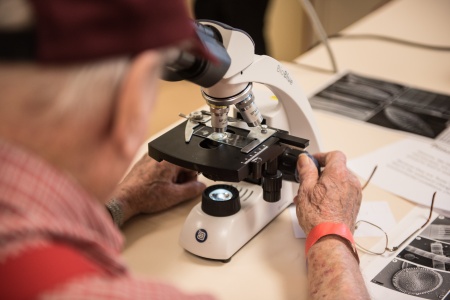
November 7, 2019, by Lexi Earl
Engaging with Engagement – Connecting Science, Public Engagement Masterclass at the Wellcome Genome Campus
This post is written by Dr Peter Craigon
At the beginning of July I visited the Wellcome Genome campus south of Cambridge to attend the ‘Public Engagement Masterclass’ put on by the Connecting Science project supported by the Wellcome Trust (https://coursesandconferences.wellcomegenomecampus.org/our-events/pem2019/ ). Whilst I felt like I had an understanding of the role of public engagement in research, gained through my work and experience, I didn’t know exactly what to expect.
One thing I thought might happen was that I would be surrounded by ‘pure’ scientists used to spending all their time in a lab, looking for ideas about how to engage the public with detailed, hard to understand science. As a researcher whose research to date has involved a considerable amount of engagement with people and groups as research participants, I wondered how I would fit into the course. On arriving I was pleasantly surprised to find that the group of people in attendance was much more diverse, with a much wider range of experience and interests in public engagement than I expected. The attendees came from disciplines ranging from the humanities and performing arts to earth sciences and social sciences and psychology which ensured that the perspectives of the masterclass were much broader than I had initially expected.
Over the course of the two and half days we undertook a deep dive into public engagement and its role within research through presentations, demonstrations and case studies from experts, participants and different groups with an interest in public engagement. Over the course, public engagement was shown to be a vital part of research. It can inform and engage ‘the public’ with the work that their money is often funding and improves the quality of the research, by creating a dialogue with the society it serves, enabling them to participate in the research process. This was contrasted with older conceptions of deficit models whereby ‘the public’ were seen as ‘lacking’ or unable to understand the nature of science and research thereby rendering efforts to engage with them futile or a waste of the time that could be spent on research.

Our LEGO sequencer being used at the Festival of Science and Curiosity
Varied sessions of the masterclass focused on different sections of ‘the public’ as audiences; from education and third sector organisations, to city and regional areas – interestingly for me, focusing on Nottingham and example ideas of pop-up science ‘shops’ and science festivals. From these discussions, lessons were drawn about the expectations and difficulties of working with groups of ‘the public’ to help us to develop successful mutually beneficial partnerships with different organisations. Drawing on the expertise in the masterclass we were also able to gain advice for our own work, for example, holding one to one mentoring sessions. I particularly enjoyed a discussion about the ethical limits of engagement that provided useful grounding and context for the sessions. We were encouraged to use what we learned and develop our own public engagement plan for our research. To help us think about this we used a 3 ‘p’s approach to consider the Purpose, Process and People involved in our public engagement at all stages of a research process whilst evaluating our activities throughout.

Food Tales asks visitors to contribute a food story, memory, picture or recipe that is added to the collection on the board.
The most fascinating element of the course was meeting the range of people that the masterclass brought together and getting to know a little bit about their research and experience of public engagement. I had many memorable conversations over the three days with people working in such a wide range of areas. I came to learn about Marsquakes (like earthquakes but on Mars); virtual reality simulations of bullying to investigate psychological resilience; whether poo from plankton sinks or floats and the effect this has on the environment; making birthday cards to engage school students with the contents of a historical archive; engagement materials on the scientific basis of forensic evidence to aid deliberation by judges and juries in court room situations; and theatre and performance to engage audiences with the experience of growing up in care.

Experimenting with plant growth and stress
I came away from the course with a broader appreciation of the context of public engagement with research and a multitude of creative ways of embedding engagement throughout research projects. Whilst I didn’t have a specific research area or project to focus my learning about public engagement on, I am keen to apply the ideas and approaches that I gained from the course to my work with the Future Food Beacon and to share it with my colleagues, so if you would like to know more then please get in touch.
Peter Craigon is a Research Fellow in Ethics, Legislation and Engagement and member of the Future Food Beacon, working with Dr Kate Millar and Professor Richard Hyde on developing tools to encourage ethical engagement and regulatory responsiveness for researchers working in food and agricultural innovation and beyond. He previously worked at the Horizon Digital Economy Research Institute at the University of Nottingham developing a tool to enable ethical design of IT based technologies and also at the University of Nottingham Veterinary School researching dog behaviour. Alongside this he completed a multidisciplinary PhD at the Horizon Centre for Doctoral Training also at the University of Nottingham exploring how social maps create knowledge about place. If you want to find out more about Peter’s experience at the Wellcome campus please email: Peter.Craigon4@nottingham.ac.uk
No comments yet, fill out a comment to be the first

Leave a Reply